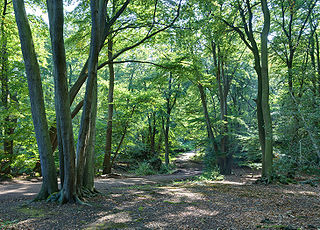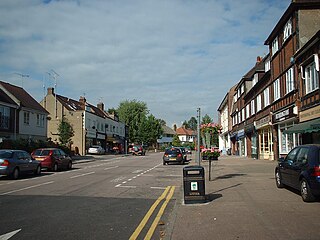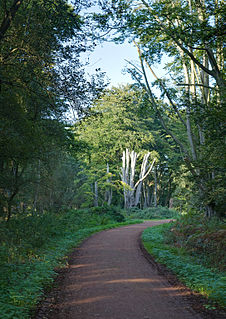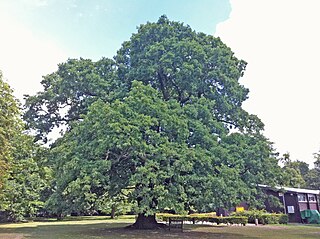
Richard Turpin was an English highwayman whose exploits were romanticised following his execution in York for horse theft. Turpin may have followed his father's trade as a butcher early in his life but, by the early 1730s, he had joined a gang of deer thieves and, later, became a poacher, burglar, horse thief and killer. He is also known for a fictional 200-mile (320 km) overnight ride from London to York on his horse Black Bess, a story that was made famous by the Victorian novelist William Harrison Ainsworth almost 100 years after Turpin's death.

Tom King was an English highwayman who operated in the Essex and London areas. His real name is thought to have been Matthew King; whether "Tom" was a nickname or an error in reporting his crimes is uncertain, but it is the name by which he has become popularly known. Some sources claim that he was nicknamed "The Gentleman Highwayman" and he was also known as “Captain Tom King”. A contemporary account of his last robbery also mentions a brother, either John or Robert King, who was captured by the authorities on that occasion. Other reports also mention an “Elizabeth King”, possibly his wife who is mentioned in King's will.

Loughton is a town and civil parish in the Epping Forest District of Essex. Part of the Greater London Urban Area for statistical purposes, the town borders Chingford, Waltham Abbey, Theydon Bois, Chigwell and Buckhurst Hill, and is 12 miles (19 km) northeast of Charing Cross.

Epping Forest is a 2,400-hectare (5,900-acre) area of ancient woodland, and other established habitats, which straddles the border between Greater London and Essex. The main body of the forest stretches from Epping in the north, to Chingford on the edge of the London built-up area. South of Chingford the forest narrows, and forms a green corridor that extends deep into East London, as far as Forest Gate.

A highwayman was a robber who stole from travellers. This type of thief usually travelled and robbed by horse as compared to a footpad who travelled and robbed on foot; mounted highwaymen were widely considered to be socially superior to footpads. Such criminals operated until the mid or late 19th century. Highwaywomen, such as Katherine Ferrers, were said to also exist, often dressing as men, especially in fiction.
Thomas Willingale (1799–1870), lived in the village of Loughton in Essex, United Kingdom. He was instrumental in the preservation of Epping Forest and is still remembered for his actions. He is commemorated by an article in the Oxford Dictionary of National Biography, on which this article is based.

Buckhurst Hill is a suburban town in the Epping Forest district of Essex, England. It is part the Greater London Urban Area and adjacent to the northern boundary of the London Borough of Redbridge. The area developed following the opening of a railway line in 1856, originally part of the Eastern Counties Railway and now on the Central line of the London Underground.

Epping Forest is a constituency represented in the House of Commons of the UK Parliament since 1997 by Eleanor Laing, a Conservative.

Theydon Bois is a village and civil parish in the Epping Forest district of Essex, England. It is 1.4 miles (2.2 km) south of Epping, 0.85 miles (1.3 km) northeast of Loughton and 6 miles (9.6 km) south of Harlow. The population was 4,062 as at the 2011 Census.
Little Cornwall is the name given to part of Loughton, Essex, England. It is the hilly part of north-west Loughton closest to Epping Forest and characterised by steep hills, weatherboarded houses, narrow lanes and high holly hedges. There are many architecturally significant properties in this part of Loughton, including 18th-century and Arts & Crafts houses as well as Victorian homes ranging from small terraced cottages to large mansions.

Carry On Dick is a 1974 British comedy film, the 26th release in the series of 31 Carry On films (1958–1992). The story is based on the Dick Turpin legend and features Turpin (James) as an antihero, attempting to evade capture by the authorities.

Loughton Camp is an Iron Age Hill fort in Epping Forest, one mile (1.6 km) northwest of the town of Loughton.
Loughton is a town in the county of Essex in England. The first settlement can be traced back to 2,500 years ago, but the earliest records of the modern-day site of Loughton are from the Anglo-Saxon era of English history, when it was known as Lukintone. After the Norman conquest it became part of the estate of Waltham Abbey and is mentioned in the Domesday Book as Lochintuna. It was during the 17th century, however, when Loughton began to grow significantly as a coaching stop on the newly created main route to Cambridge and East Anglia. With good transport links and proximity to both London and also Epping Forest and the countryside, it became a popular location for aristocratic and wealthy Londoners to have a home.

Epping is a market town and civil parish in the Epping Forest district of the County of Essex, England. The town is 17 miles (30 km) northeast from the centre of London, is surrounded by the northern end of Epping Forest, and on a ridge of land between the River Roding and River Lea valleys.

High Beach is a village inside Epping Forest and is located approximately eleven miles north east of central London. It is the only settlement inside Epping Forest, and falls within the civil parish of Waltham Abbey and the ward of Waltham Abbey High Beach in the Epping Forest District of Essex, and for statistical purposes forms part of the London Metropolitan Area and Greater London Urban Area.

The Green Man is a public house in Putney in the London Borough of Wandsworth, on the edge of Putney Common, parts of which date back to around 1700. The pub was once frequented by highwaymen and was a popular place for participants to fortify themselves before or after a duel on nearby Putney Heath.

Aldborough Hatch is an area in Ilford in east London, England, within the London Borough of Redbridge. It is located 11.1 miles (18 km) east-northeast of Charing Cross. It is a semi-rural locality situated to the east of Barkingside and Newbury Park.

The Gilwell Oak is an oak tree on the grounds of The Scout Association's headquarters at Gilwell Park, Essex. It is reputed to have been used as a hiding place by Dick Turpin and since the 20th century has become closely associated with the Scout movement. The tree is situated close to the training ground for the association's first Scout leaders and provided material for the earliest Wood Badges. The oak inspired Scout movement founder Robert Baden-Powell to create "the moral of the acorn and the oak" an analogy for the growth of the Scout movement and the personal growth of its members. The Gilwell Oak was voted England's Tree of the Year by the public in 2017 and was subsequently selected by a panel of experts as the UK Tree of the Year.

The Green Man is a pub and road junction on High Road, Leytonstone, London. The pub has been rebranded as part of the O'Neill's chain. The current 1920s building replaced an earlier public house, close to the original site; which was built around 1668 and mentioned by Daniel Defoe.
















